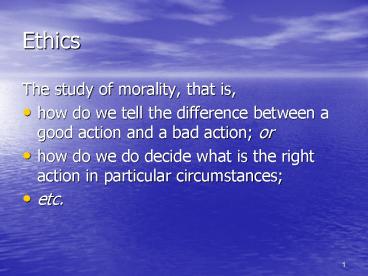Ethics - PowerPoint PPT Presentation
1 / 13
Title:
Ethics
Description:
Ethics The study of morality, that is, how do we tell the difference between a good action and a bad action; or how do we do decide what is the right action in ... – PowerPoint PPT presentation
Number of Views:46
Avg rating:3.0/5.0
Title: Ethics
1
Ethics
- The study of morality, that is,
- how do we tell the difference between a good
action and a bad action or - how do we do decide what is the right action in
particular circumstances - etc.
2
Rule-based ethics
- There is a small set of very specific rules that,
it is claimed,can be applied to cover any
situation. - The ten commandments
- Love the Lord thy God with all they heart and
strength, and thy neighbour as thyself.
3
Consequentialism
- Its not the actions themselves that matter but
their consequences. To apply this, we need a way
of judging the consequences. - That action is best, which produces the greatest
good for the greatest number.
4
The great debates
- rule-based v. consequentialism
- absolutism v. relativism
- where does duty come in?
- human rights
- in what sense can states, companies and other
organisations be held morally responsible? - how does the moral responsibility of the
individual relate to the collective?
5
Professional codes of conduct
- rule-based but with some aspects of
consequentialism - generally seen as specific to a country and
profession - address particularly the malpractices to which
members of the profession are especially subject - may be aspirational or operational
- not the same thing as codes of practice.
6
BCS Code of Conduct
- The Public Interest
- Safeguard public health, safety and the
environment. - Respect the rights of others.
- Understand and comply with legislation,
regulations and standards. - Respect human rights.
7
Duty to Employers and Clients
- Work with care and diligence and, if your
professional judgement is overruled, indicate the
likely consequences. - Try to complete work on time and within budget
and warn immediately any overrun is foreseen. - Dont accept or offer commissions or bribes.
- Dont disclose confidential information.
8
Duty to Employers and Clients (2)
- Try to avoid becoming party to activities that
conflict with 1 to 4. - Dont pretend your products or services can do
things they cant. - When acting as an independent consultant, dont
handle clients money or place orders without
authority. - Dont claim to be independent when youre not.
9
Duty to the Profession
- Uphold the reputation of the profession.
- Try to advance public understanding of computing.
- Encourage the professional development of others,
particularly those new to the profession. - Act with integrity towards other professionals.
- Dont make public statements unless qualified
(and, where relevant, authorised) to do so.
10
Professional Competence and Integrity
- Keep your knowledge up to date.
- Follow good practice.
- Dont claim to be competent when youre not.
- Take responsibility for your work and that of
your subordinates and dont terminate an
assignment except for good reason and on
reasonable notice. - Try to avoid conflicts of interest and disclose
them immediately if they are unavoidable.
11
IEEE-CS/ACM Code of Ethics and Professional
Practice (version 5.1)
- (http//www.computer.org/tab/seprof/code.htm)
12
IEEE-CS/ACM general precepts
- Act in ways consistent with the public interest.
- Best interests of client and employer, consistent
with the public interest. - Ensure products meet highest professional
standards. - Maintain integrity and independence of
professional judgement. - Adopt an ethical approach to management.
- Advance the interests of the profession.
- Be fair and supportive to colleagues.
- Keep your knowledge up to date.
13
IEEE-CS/ACM howlers
- Software engineers shall not promote their own
interest at the expense of the profession, client
or employer. - Software engineers shall not give unfair
treatment to anyone because of any irrelevant
prejudice.































